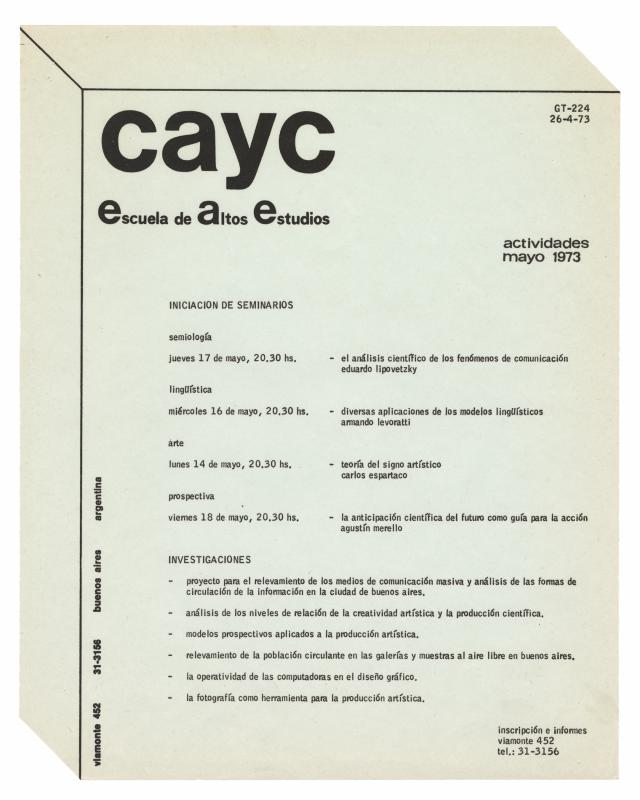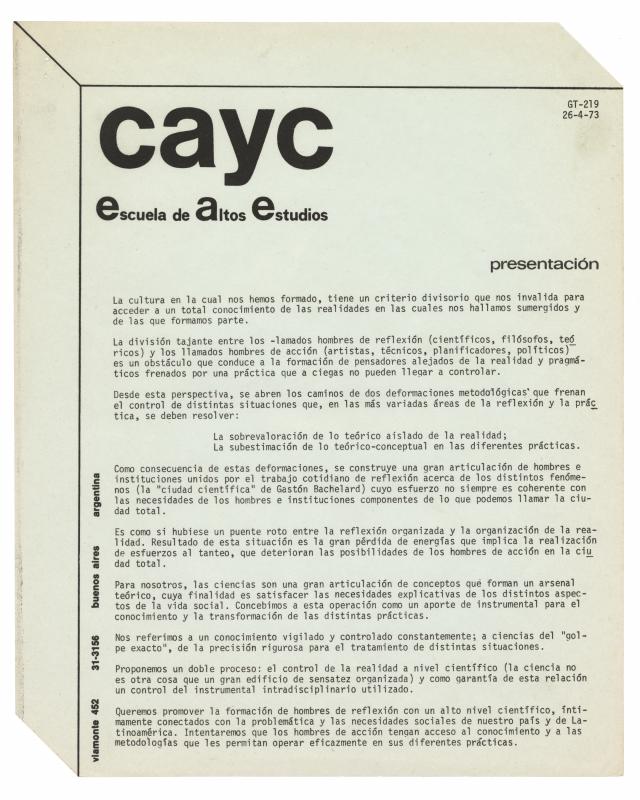Ever since it was founded, the CAYC (Centro de Arte y Comunicación), helmed by the cultural promoter, artist, and businessman Jorge Glusberg, was intended as an interdisciplinary space where an experimental art movement could flourish. The establishment of collaborative networks connecting local and international artists and critics played an important role in this process. In addition to the exhibitions, a program of different activities exposed attendees to the latest in art and scientific thinking. According to Glusberg, the coordination between theoretical thinking and artistic practice was an essential part of social change.
During the military dictatorship of General Juan Carlos Onganía, the CAYC became a cultural home for the Fundación de Investigación Interdisciplinaria, a space that welcomed a group of dissident professors from the Facultad de Arquitectura y Ciencias Exactas de la Universidad de Buenos Aires after the military takeover of the university in what came to be known as “La Noche de los Bastones Largos” in June 1966. In its early years the center organized a variety of activities with intellectuals that contributed to the circulation of ideas from different disciplines (analytical philosophy, mathematical logic, epistemological problems, psychology, semiotics, and linguistics), which had been excluded from official circles.
The objectives described in the relevant newsletters (GT-201; doc. no. 1478752, GT-201- A; doc. no. 1478753, GT-224; doc. no. 1478771, GT-219; doc. no. 1478755) were apparent in the activities organized by the EAE (some of which were more technical than interdisciplinary), as well as in the art produced by artists associated with the center. This initiative was an expression of the mood of openness of the “Cultural Spring” that flowered during the brief democratic presidency of Héctor J. Cámpora, which lasted forty-nine days in 1973. It was seen as putting an end to a seven-year period of military dictatorships (first under Onganía, then Levingston, and then Lanusse), after Peronism had been outlawed for eighteen years.
The seminar announced in this newsletter focuses on some arguments previously presented by Armando J. Levoratti (1933–2006), a priest and biblical scholar who studied at the Seminario de La Plata, the Gregorian University, and the Pontifical Biblical Institute in Rome. He kept in touch with the Verbo Divino Publishing House in Buenos Aires. He taught at the Oriental Institute at the University of Chicago. In a previous text (GT-232-232/1; doc. no. 1478805), he presented an innovative structuralist-based approach to linguistics that relied on the study of society and culture. The center used these interdisciplinary events to explore the possibilities that recent linguistic theories might offer for artistic activity, particularly those that would support the CAYC’s program of activities and the creation of an institutional poetics of its own that would establish its identity in Latin America.


